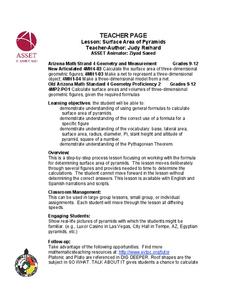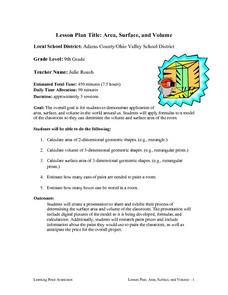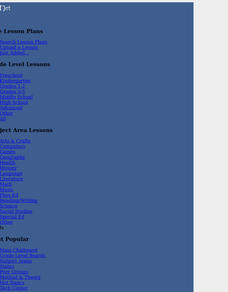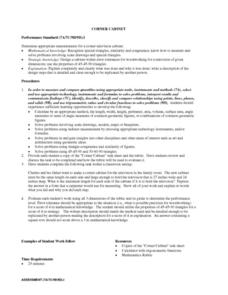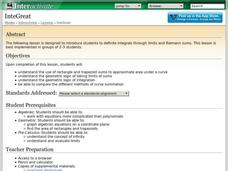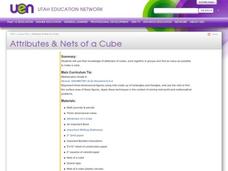Curated OER
Surface Area of Pyramids
Pupils identify the surface area of pyramids and other polygons. In this geometry lesson, students find the different measurements for the different parts of a polygon. They use the surface area formula to solve for the surface area,
Curated OER
A Cone and Its Net
Create and investigate nets for solid shapes with your class. They identify the different parts and faces of each polygon and solid then calculate the surface area and volume of cones. They use circle sectors of varying sizes to build...
Curated OER
NetsS.A. of Prisms
Young scholars build nets of three-dimensional prisms based on the dimensions they are given for hexagonal prism, triangular prism, rectangular prism. Working in groups, they use their prisms and calculate the Surface Area and Lateral Area.
Curated OER
Area, Surface, and Volume
Ninth graders demonstrate application of area, surface, and volume. They apply formulas to a model of the classroom so they can determine the volume and surface area of the classroom.
Illustrative Mathematics
Christo’s Building
Hook your charges on how to solve a real-world art problem with mathematics by showing works of Christo. You can find eye-catching images on the Christo and Jeanne Claude webpage. Here, math learners help Jean Claude and Christo prepare...
Curated OER
Surface to Volume Ratios
Students measure the rate of diffusion and to calculate the surface area to volume ratios of varying cell sizes. The lesson plan is very clearly organized with a useful student worksheet provided. They perform a lab experiment which is...
Curated OER
Using Nets to Find Surface Area
Eighth graders explore three-dimensional objects (prisms, pyramids, cylinders and cones) to draw nets. They use the understanding of drawing nets to find the surface area of pyramids and cylinders.
Curated OER
Surface Area and Volume of a Cylinder
Seventh graders find the surface area and volume of a cylinder. In this area and volume instructional activity, 7th graders complete several activities to learn the volume and surface area of cylinders.
Curated OER
Cap-It to the Max
Eighth graders compare the volume of three cylinders constructed from the same size sheet of paper. They use concrete and graphical models to derive formulas for finding perimeter, circumference, area, and volume of two and three...
Utah Education Network (UEN)
Candies R Us
A box is fun to make, especially when it's a candy box! These activities help to cement understanding of the difference between surface area and volume. Have individuals measure the surface area of their box in two-dimensions before...
National Wildlife Federation
Wherefore Art Thou, Albedo?
In the sixth lesson in a series of 21, scholars use NASA data to graph and interpret albedo seasonally and over the course of multiple years. This allows learners to compare albedo trends to changes in sea ice with connections to the...
Curated OER
Pyramids on Parade/Nets
Students sketch the shape of three dimensional pyramids using nets. In this geometry lesson, students differentiate a pyramid from other three dimensional shape. They define the attributes of pyramids.
Curated OER
Camping with a Triangular Prism and Its Net
Learners differentiate triangular prisms from other prisms using nets. In this geometry lesson, students define the properties of a triangular prism and its symmetry. They build a triangular prism moving lines around.
Curated OER
A Sphere and Its Net
Students identify and sketch the nets for sphere. In this geometry activity, students differentiate between two and three dimensional shapes. They find the surface area of each sphere.
Mathematics Assessment Project
Designing 3d Products: Candy Cartons
Wouldn't it be great to work in a candy factory? Learners get their chance as they first design a carton for a candy that meets certain requirements. They then examine and analyze nets and explanations in sample student responses.
Curated OER
CORNER CABINET
Ninth and tenth graders calculate the length, width, height, perimeter, area, volume, surface area, angle measures or sums of angle measures of common geometric figures. They solve problems involving scale drawings, models, maps or...
Curated OER
Perimeter All Around
Students explore perimeter and area of regular and irregular polygons. They experiment with color squares and create different arrangements using the same number squares. Then they compare the area and perimeter measurements of each.
Curated OER
Fencing Your Backyard
Students use geosketch ro create a fence. In this geometry lesson, students identify the amount of material and area needed to create a fence. They calculate the perimeter and surface area of their fence.
Curated OER
Classifying Pyramids
Students study pyramids. In this prisms lesson, students explore the attributes of pyramids. Students will explore the lateral surface area of pyramids and be able to distinguish pyramids from other space shapes.
Shodor Education Foundation
InteGreat
Hands-on investigation of Riemann sums becomes possible without intensive arithmetic gymnastics with this interactive lesson plan. Learners manipulate online graphing tools to develop and test theories about right, left, and midpoint...
Earth Day Network
Staying Green While Being Clean
Clean up the environment with a lesson plan that focuses on replacing hazardous cleaning supplies with green, environmentally-friendly products. Using a dirty patch of surface as a control area, kids clean other parts of various surfaces...
Curated OER
Attributes & Nets of a Cube
Third graders engage in a lesson that focuses on the attributes and forming of a cube. They construct a cube using different combinations while comparing a square with only two-dimensions. Students fold paper while following the...
Curated OER
Sketching Cylinders
Learners create nets of cylinders. In this geometry lesson, students calculate the surface area of cylinders and other solids. They show their understanding of three-dimensional shapes by solving problems.
Curated OER
Math: Equal Area Triangles
Students examine a math worksheet and determine how to divide a single triangle into four of equal area. Using geometric principles, they sketch two additional ways to divide into into four equal triangles. To conclude, students...


